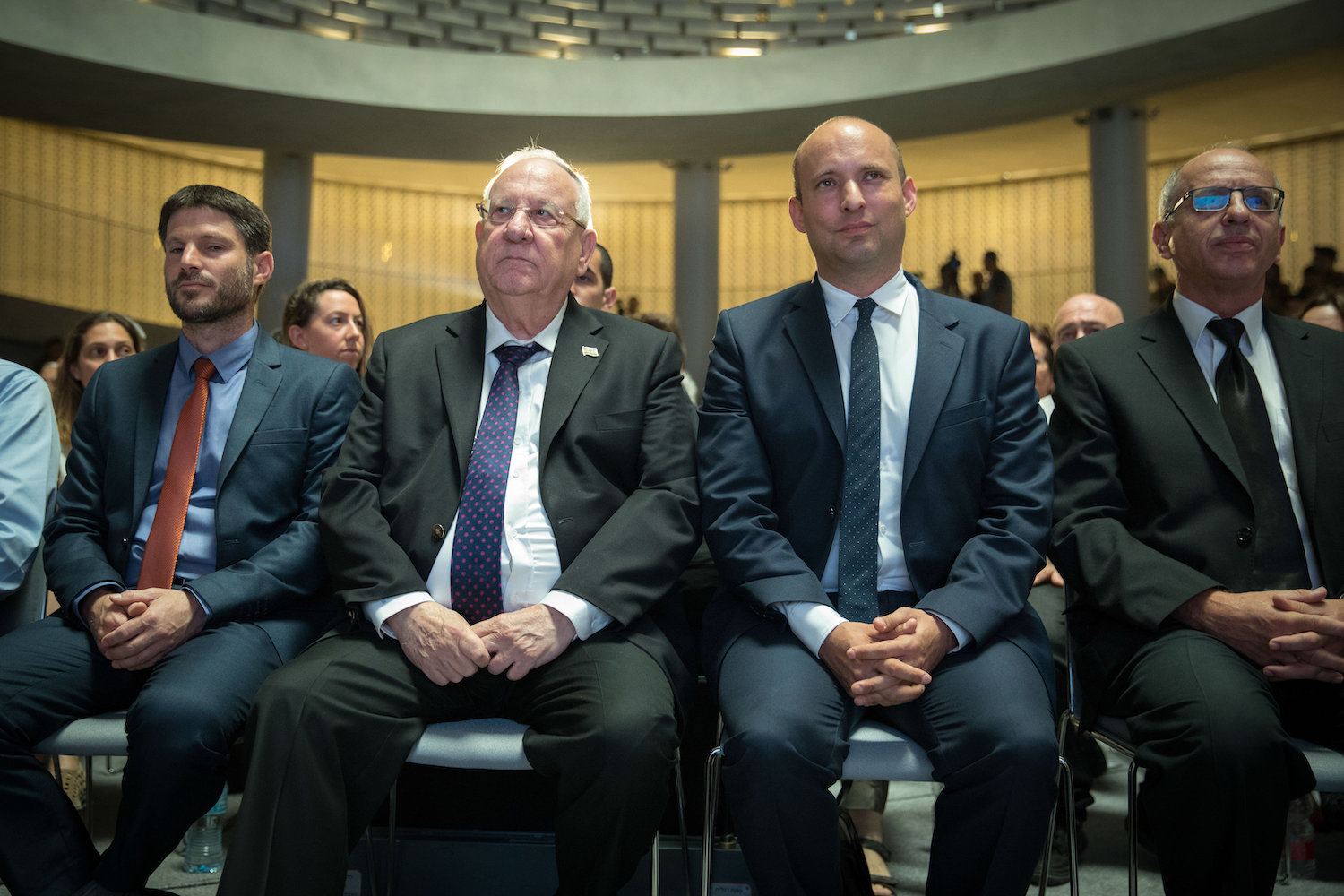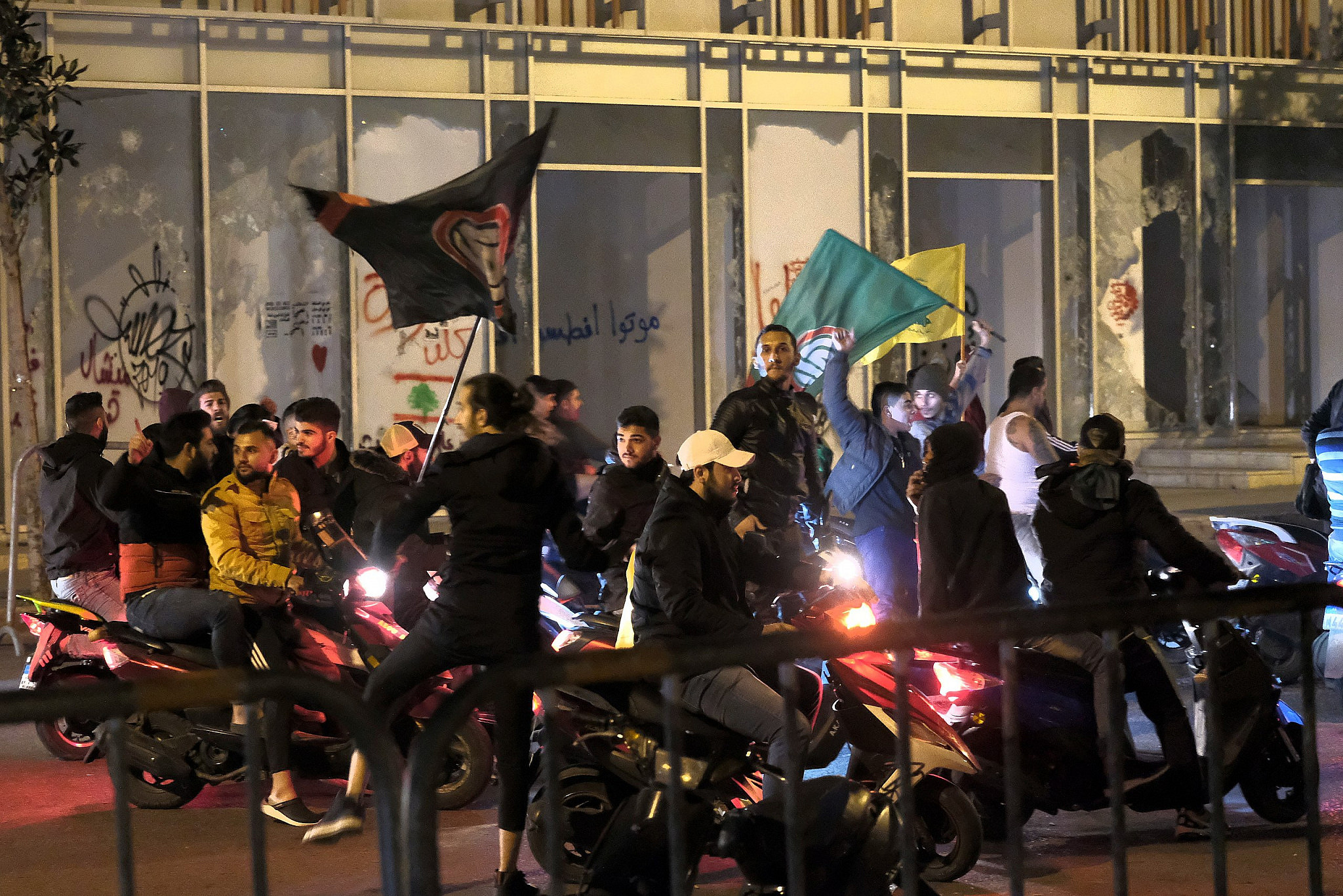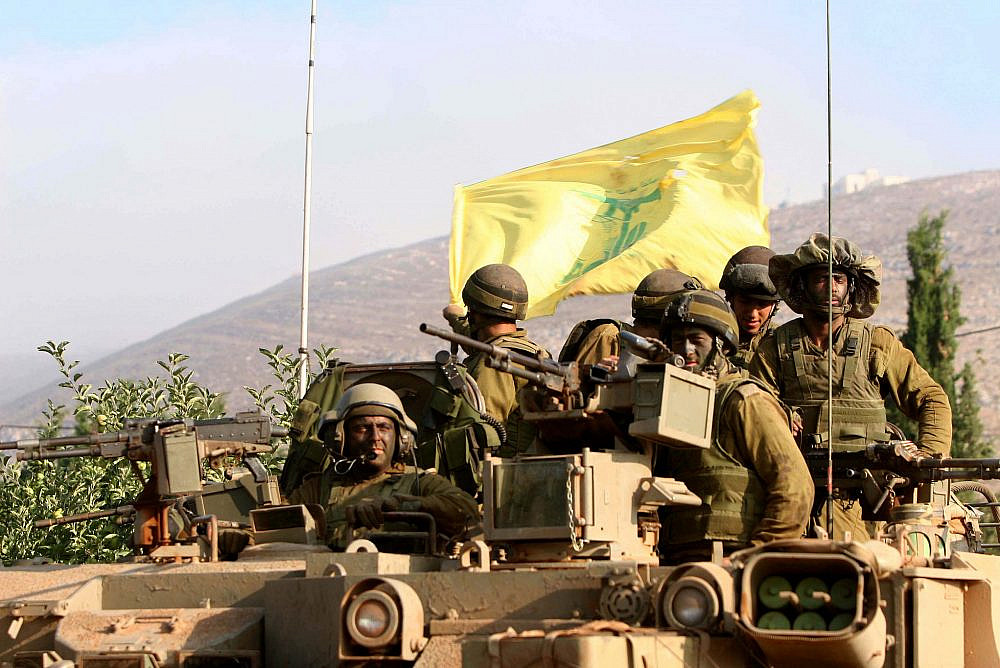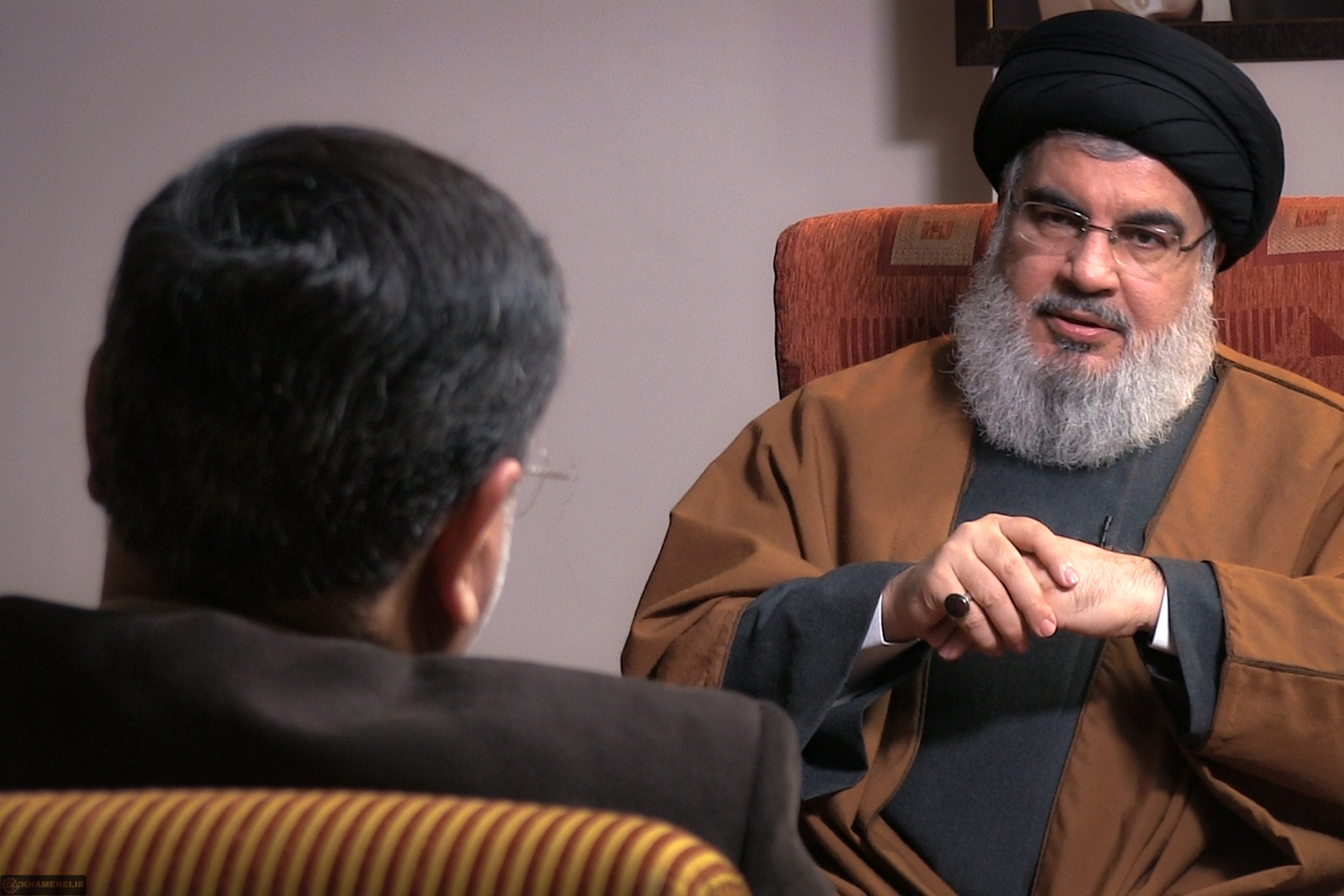In the two decades since Israel ended its 18-year military occupation of southern Lebanon, a strange, symbiotic relationship has formed between Israel and the Lebanese Islamist group Hezbollah. Reinforced by geopolitical power plays, these two enemies have grown dependent on each other to advance their ambitions both within their own countries and in the wider region. This observation may seem like a conspiracy theory, yet it needs no conspiracy.
On the surface, one would be hard pressed to find two more mutually incompatible political actors: Israel considers Hezbollah a terrorist organization, and Hezbollah’s very raison d’etre derives from its resistance to Israel. But as murmurs of a possible regional war grow louder, hanging by the thread of the latest talks in Vienna over Iran’s nuclear program, that interdependence has only become starker.
This symbiotic relationship is not new, and is rooted in the years of the occupation of southern Lebanon. Israel’s brutal invasion in 1982, justified under the pretext of fighting the Palestine Liberation Organization (PLO), helped to destroy what remained of a left-wing, Arab nationalist coalition that had allied with Palestinian resistance groups against Maronite militias at the start of the country’s civil war in 1975 (Syria, which occupied most of Lebanon since 1976, had carried out much of the job before Israel’s arrival). This decimation — which included high-profile assassinations by Islamists of leftist and communist leaders like Mehdi Amel and Husayn Muruwwa — left the Lebanese political field wide open for Islamist groups to step into the fray.
Following the Israeli invasion, the nascent Iranian regime of Ayatollah Khomeini, which established a theocratic republic in 1979, saw an opportunity to fund, train, and equip an armed Shi’a group that, with Syrian president Hafez al-Assad’s help, would officially be declared as Hezbollah in 1985. Hezbollah quickly replaced the more established Amal movement as the most popular party within the Shi’a community and among Islamist supporters, as the latter was viewed as too complacent toward the Israeli occupation (in the topsy-turvy fashion of Lebanese politics, Hezbollah and Amal are now allies).

Hezbollah’s rapid growth in Lebanon was fueled as much by Israeli aggression as direct Iranian-Syrian support. For 15 years, Hezbollah led a guerrilla campaign against Israeli forces and their allies in the Christian-led South Lebanon Army, replacing the expelled PLO as the leading resistance group fighting Israeli rule. Hezbollah’s military tactics, which incurred scores of Israeli casualties and weakened the army’s hold on the south, played a significant role in forcing Israel’s decision to withdraw from Lebanon in 2000. In a previous piece for +972, I wrote that “it is in the fires of the [Israeli] occupation that Hezbollah was forged” — and those fires are still raging to this day.
Cyclical narratives
In the years since, an unusual and uneasy interdependence has formed between the two enemies. Today, Hezbollah remains one of the major threats that the Israeli establishment uses to justify its militarization of daily life — an extension of the “Arab-Israeli conflict” which relies on an essentialist understanding of hostile “bad” Arabs (like Hezbollah, Hamas, and Syria’s Bashar al-Assad) versus peaceful “good” Arabs (such as Egypt, Jordan, and Gulf Arab states). Israel, meanwhile, remains Hezbollah’s main justification for maintaining its military hegemony in Lebanon; virtually every domestic policy debate, especially related to Hezbollah’s weapons, is filtered through this lens.
This symbiotic relationship was consolidated after the liberation of southern Lebanon in 2000, and further entrenched during the 2006 war sparked by Hezbollah’s capture of two Israeli soldiers. In both events, Hezbollah portrayed itself as Lebanon’s national defender against Israeli aggression. For example, in a speech marking the end of the 2006 war, Hezbollah’s secretary-general, Hassan Nasrallah, declared that “we stand before a strategic and historical victory for Lebanon — all of Lebanon, for the resistance, and for the whole nation.” On the war’s ten year anniversary in 2016, Nasrallah said: “when we talk about victory in the July war, we shall talk about… foiling the goals of the Israeli aggression.”
This narrative, in turn, has been continuously fed by Israel through its own political rhetoric and threats of collective punishment, which effectively treat all Lebanese as Hezbollah’s militiamen. In 2018, for example, then-Education Minister Naftali Bennett, now Israel’s prime minister, remarked that Hezbollah’s success in the country’s elections that year “strengthen what has been our approach for a while: Hezbollah = Lebanon. The State of Israel will not distinguish between the sovereign state of Lebanon and Hezbollah, and will view Lebanon as responsible for any action from within its territory.”
Likud MK Nir Barkat (a former mayor of Jerusalem) took that logic of collective punishment even further in December, when he cited Hezbollah to justify launching a major war on Iran and its allies. “Since Hezbollah is a proxy of Iran, we need to change the equation and say openly that if they fire rockets on Israel, it won’t lead to a Third Lebanon War, but rather a First Iran War; and our target must be Tehran.” At times it felt that for every statement by Nasrallah about Israel’s endless threat to Lebanon, there was a statement by an Israeli official confirming it.
In recent years, this cyclical narrative has also become evident, ironically, in interactions between Hezbollah supporters and their Lebanese critics when Israeli warplanes violate Lebanese airspace. For example, during one of many Israeli air raids above Lebanon in January 2021, a Lebanese journalist (who will remain anonymous for personal safety) complained on Twitter about how these raids had become common occurrences. A Hezbollah supporter replied to her mockingly, “Well, surely your army can take them down,” followed by an emoji of a smirking face.
The reference to “your army” was a deliberate, tongue-in-cheek way of implying that the Lebanese national army is incapable of defending the country from Israel on its own. Hezbollah, however, is still widely viewed by its supporters (and sometimes, reluctantly, by its opponents too) as a necessary force to fulfill that national role. As Bennett’s remarks indicate, this view is affirmed and bolstered by the Israeli establishment itself as it centers Hezbollah in virtually all Lebanon-related statements — and, increasingly, Iran-related discussions as well.
Putting the two together, we can see how statements like Bennett’s complement those of Hezbollah’s supporters. Both have an interest in conflating Lebanon with the party, and both do so to justify political violence. In such moments, any argument made by someone who is critical of this de facto arrangement is drowned out as either naïve or suspect.

Because of this, both the Israeli government and Hezbollah thrive on the militarization of everyday life. Every time Israeli warplanes violate Lebanese airspace, they reinforce the notion that nothing that happens on Lebanese soil is ever met with accountability. Israel can do whatever it wants, whenever it wants — and the Israeli army seems to enjoy reminding the Lebanese of that fact.
What follows these airspace violations has become a familiar scenario: the Lebanese state officially complains about it to the UN, the UN replies that Israel should stop violating Lebanese airspace, and… that’s it. The sun rises the next morning, and everyone goes back to their daily routine. Such violations weaken whatever legitimacy the idea of a Lebanese republic musters.
By comparison, Hezbollah is able to create political spectacles, such as bringing in Iranian fuel for electricity, while the Lebanese state fails to deal with a seemingly never-ending power crisis. The rapprochement between Israel and Gulf Arab states has further served to strengthen Hezbollah’s narrative of a region-wide conspiracy against “the resistance” and its Iranian patron. Israel’s own actions in Lebanon reinforce that narrative, and force many Lebanese to make a choice they do not want to make: to accept Hezbollah as the lesser evil.
Cracking the ‘resistance’ image
The recognition of this violent, symbiotic relationship remains absent in mainstream discussions about Israel and Hezbollah. Indeed, most observers prefer to simply take the two sides’ statements at face value: that they oppose one another, and therefore cannot have mutual interests. We see these takes from the usual foreign policy circles in the United States, the Gulf, and Israel, which portray Hezbollah as a permanent terrorist threat, but also in many “anti-imperialist’ circles”, which flip that logic and glorify the group instead.
The problem with such an analysis is that it relies almost solely on the 1982 occupation and the 2006 war to explain everything about the Hezbollah-Israel relationship, without taking into account the significant dynamics that have emerged following the 2011 Arab Spring. Crucially, it does not take into consideration Hezbollah’s and Iran’s roles in the counter-revolutions that followed the Arab uprisings, especially in Syria; these interventions have actually complemented the Gulf monarchies’ efforts to crush alternatives to the region’s authoritarian regimes, including in Bahrain and Egypt. It also ignores the fact that Hezbollah has used its military experience of resisting Israel to aid the Syrian regime in repressing those resisting the rule of President Bashar al-Assad, and invoked a similar discourse to demonize Lebanese anti-government protesters as “foreign agents.”
Where Israel is concerned, Hezbollah’s narrative is clear: not a day goes by without Al Manar, Hezbollah’s broadcasting outlet, declaring that Israel fears the party and its military strength. At the time of writing, for example, Al Manar quoted Yaakov Lappin of the Begin-Sadat Center for Strategic Studies as claiming that Hezbollah is now twenty times stronger than it was on the eve of the 2006 war. It matters, in other words, for Hezbollah to promote an image of power and preparedness to step up as the “resistance.” And Israel’s policies toward Lebanon have done nothing but strengthen the group’s hold over the country.
Hezbollah’s narrative of itself as the “resistance,” however, has only ever been weakened when the group manipulates it to justify actions that are unrelated to Israel.
Take the example of the October 2019 uprising, Lebanon’s largest anti-government protest movement in decades. Since the demonstrations began, Hezbollah has been the most consistent opponent of any reforms being demanded on the streets. Their supporters, as well as that of their ally Amal, have threatened, beaten, and allegedly even killed opponents, while repeatedly destroying tents and other equipment set up by peaceful protesters.
The party’s actions mirrored those of their pro-Iranian allies in Iraq who were also repressing, in even more brutal ways, the anti-government protests launched just a few weeks earlier. For many Lebanese, it brought into even sharper clarity how, to quote the Lebanese writer and rapper Bunasser Al-Taffar, Hezbollah’s alliance now consists of “political factions resisting the American-Israeli occupation — which favors certain Arab dictatorships — for the sake of the Russian-Iranian occupation — which backs some other Arab dictatorships.”
In the face of the mass demonstrations, Nasrallah was the first to declare that the government “mandate” opposed by the protesters would not fall. Within a week, Nasrallah declared that the protests were being hijacked by Israeli and foreign interests and could lead to a civil war. Yet despite its claims, Hezbollah could not convince most Lebanese that the protests had anything to do with Israel or Western powers, or that they were “funded by the embassies,” to borrow a common smear used by its supporters.
Indeed, protesters mocked the party’s claims by releasing memes, statements, and videos of individuals calling themselves “the leader of the revolution” and distributing sandwiches labeled “provided by the embassies” on the streets. Such accusations also rang hollow for the simple reason that the protesters were opposing a government whose own prime minister, Sa’ad Hariri, was closely connected both politically and financially to another foreign state, Saudi Arabia.
Since then, Hezbollah learned to walk a fine line in invoking Israel whenever it cracked down on protesters in Beirut, southern Lebanon, and the Bekaa valley during the early days of the October revolution. The group has still continued these practices and rhetoric, but it is no longer as effective. In a not so subtle move, protesters in Nabatiyeh in southern Lebanon compared Hezbollah itself to the Israeli army, declaring after a crackdown by Hezbollah that “Nabatieh will not be broken… ask the Zionists.”

The party had to walk another fine line after the assassination of anti-Hezbollah activist Lokman Slim on February 4, 2021 — an assassination widely believed, including by Slim’s own family, to have been carried out by the group. More recently, Hezbollah has threatened Tarek Bitar, a prominent judge investigating the August 2020 Beirut port explosion, and by doing so sent another clear message that accountability for the crimes of Lebanon’s political elite will always be out of reach.
Whether grassroots opposition to Hezbollah and its “resistance” narrative continues to grow is difficult to establish. Lebanon is going through unprecedented crises and this has led many to focus on just surviving daily life. At the same time, rival sectarian parties such as the Christian-led Lebanese Forces (allied with Israel during the Lebanese civil war) have tried to ride the wave of the October uprising. Even without taking Israel into account, there is a possibility that domestic, intra-sectarian affairs will continue to dominate Lebanese politics for the foreseeable future.
That being said, it is worth contrasting the Israeli government’s stated goal of weakening Hezbollah with the group’s success at establishing itself as the hegemonic power in the country. Time and time again, Israel’s policies toward Lebanon have played into Hezbollah’s hands. Were we not aware that Lebanon and Israel are officially “enemy states,” we might be forgiven for believing that both governments were inadvertently working toward the same goal: to crush any alternative to the regional status quo, and by doing so, empower Hezbollah in the process. As far as propaganda is concerned, Hezbollah could not ask for a better enemy.
We’re now left to wonder whether Israel is in fact deliberately, rather than unconsciously, operating by the same playbook with regards to Hezbollah. Judging by Israeli officials’ ongoing hostile rhetoric — including Barkat’s remarks on a “First Iran War” — this seems to be the case. We can therefore expect local Lebanese voices critical of Hezbollah to continue being drowned out by those arguing for its necessity as a resistance group against Israel. It is a reminder of how both Israel and Hezbollah are disconnected from the lives of ordinary civilians in Lebanon, while constantly threatening these very same lives.



